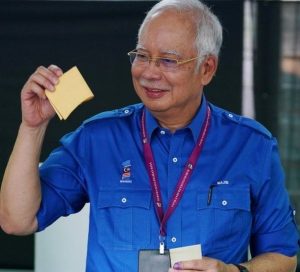If everything goes according to plan, then 92 year old Dr Mahathir Mohammed who ruled Malaysia for over two decades before leaving power in 2003 is back in power after his coalition won the election last night. There are, however, doubts if he would be sworn-in as the King’s Palace the (constitutional monarch) which signs the certificate to that effect has been quoted as saying that might not happen although it has not said why. Najib Razak, the outgoing Prime Minister provides a hint as to why: It is up to the king to decide who is sworn-in as the victory is that of a coalition, not a single party. Mahathir is insisting on being sworn in-today which points to that little confusion. How that gets sorted out is what the world would be watching out.

Defeated incumbent
But the defeated incumbent, Najib Razak and his Barisan Nasional coalition have accepted defeat. Reuters is pointing at an unwritten agreement by which Mahathir would give way to Anwar Ibrahim who was Mahathir’s deputy before being convicted for corruption after prolonged trial in the late 1990s. Ibrahim can take over from his boss once a royal pardon is secured for him by Dr Mahathir. What it means is that Mahathir won’t be long in power which he sought in anger against a corruption scandal involving the incumbent in 2015. How short that would be in this case is open to speculation. He is being described as remarkably robust for his age.
Aside from his age, the second issue of his interest in the return to power is his membership of the generation of Asian leaders who rejected Modernisation theory of development and, instead, adopted nationalist models to the chagrin of the World Bank, thereby taking their countries from Third to the First World, to borrow the language of one of them. They dispensed with human rights in favour of positive and purposeful regimentation and they are today not only manufacturing economies, they are also more peaceful societies.
In Kuala Lumpur, one could see a Church, a Mosque and a discotheque over which no one break heads or riot even though diversity in Malaysia is even more complex than Nigeria, for example. Nigeria is only one civilisation and even a candidate one for that matter because, according to Samuel Huntington, Africa has not got its own religion to be classified as a civilisation. So, he called Africa a candidate civilisation, making the eight of world civilisations he claimed would be clashing in the post Cold War. Malaysia has four civilisations co-habiting it: Confucianism, Shintoism, Hinduism and the ethnic Malays. It is, therefore, much more complex than Nigeria. The difference between diversity in Malaysia or Singapore on the one hand and Nigeria on the other is, therefore, not diversity but poverty. In other words, if Nigeria deals with poverty, it would stop unnecessary bickering over True or False Federalism, concepts which have no place in Political Science anyway.
Meanwhile, the impending Prime Minister is saying no to revenge but privileging rule of law, including for journalists who mess around with the law.




























